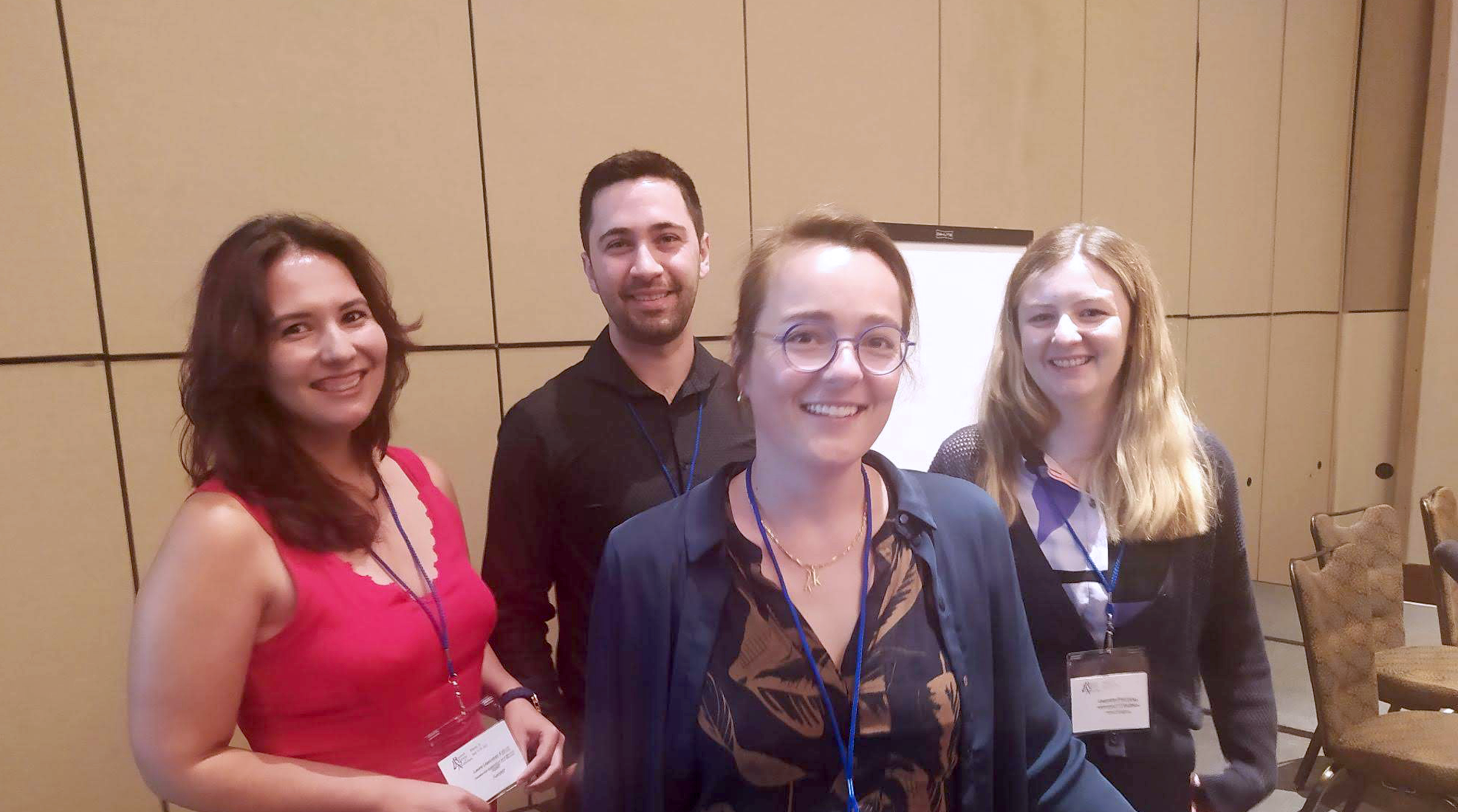
|
|
Charlotte Buckley
University of Sheffield, U.K.
Charlotte Buckley, PhD, is a Research Fellow at the University of Sheffield. Her research is focused on the development and utilization of advanced quantitative methods to understand and explore population-level health behaviors. She has developed a dynamic microsimulation model of population alcohol use in the United States and has used this to explore the relationship beween alcohol use and liver cirrhosis. This model is being extended on the SIMAH project, to investigate associations between socioeconomic inequalities, alcohol use and mortality.
Prior to joining the University of Sheffield, Dr. Buckley received her PhD from the School of Psychological Science, University of Bristol. Her wider interests are in incorporating psychological factors into complex systems models of health behaviours and outcomes.
|
| |

|
|
Laura Llamosas-Falcón
Centre for Addiction and Mental Health, Canada
Laura Llamosas-Falcón studied Medicine at the University of Cantabria. In 2021, she finished her residency and specialized in Preventive Medicine and Public Health. As part of it, she completed a Master Degree in Public Health. She also completed a two-year post doctoral position at the Institute for Mental Health Policy Research at CAMH (Toronto, Canada). During her fellowship, she improved her statistical skills and conducted several meta-analysis and meta-regressions.
Dr. Llamosas-Falcón is currently doing her PhD at the Institute of Medical Science at the University of Toronto. Her project focuses on the association between alcohol use and unintentional injuries mortality.
She has experience in analyzing epidemiological data of alcohol use and alcohol-related harms. Dr. Llamosas-Falcón has worked and collaborated in international projects with The Pan American Health Organization.
|
| |

|
|
Carolin Kilian
Centre for Addiction and Mental Health, Canada
Carolin Kilian, PhD, holds a post-doctoral research fellow position at the Institute for Mental Health Policy Research at CAMH. Her research focuses on how alcohol policy interventions impact alcohol consumption and alcohol-related mortality as a function of gender and socioeconomic status.
Her wider research interests concern public health policy, social determinants of health and alcohol’s harms to others than the alcohol user. She has previously been working at the Technische Universität Dresden (Germany) as part of several large-scale pan-European projects funded by the European Commission, and in collaboration with the European Office for Non-communicable Diseases of the World Health Organisation.
|
| |

|
|
Julia M. Lemp
Centre for Addiction and Mental Health, Canada
Julia Lemp, MSc, is a post-doctoral research fellow at the Institute for Mental Health Policy Research at CAMH. Her current research centers on understanding the differential impacts of the COVID-19 pandemic on alcohol consumption across population groups in the United States. Further, she will contribute to modeling the effects of alcohol policy interventions, particularly screening and brief interventions, using the SIMAH microsimulation model.
She earned her Master’s degree in Psychology in 2019 and is expected to complete her PhD in Global Health from Heidelberg University in 2024. In her previous work, she applied quasi-experimental methods to analyze routine health data, providing valuable insights into the effectiveness of behavioral interventions in real-world settings. She has experience in conducting mixed-methods studies and in analysing epidemiological data on non-communicable diseases.
|
| |

|
|
Yachen Zhu
Alcohol Research Group, U.S.
Yachen Zhu, Ph.D., is a Biostatistician at the Alcohol Research Group, Public Health Institute. Dr. Zhu received her Ph.D. in Public Health with a concentration on Global Health from the University of California, Irvine. She obtained her Master's degree in Applied Statistics and Bachelor's degree in Statistics from the University of Science and Technology of China. In her doctoral dissertation, she used advanced statistical techniques to investigate the impacts of environmental risk factors on susceptible populations in the US. She has experience implementing Monte Carlo simulations and Approximate Bayesian Computation for complex environmental and pharmacokinetic models. She brings her expertise in Statistics and Public Health into alcohol-related health studies.
|
| |

|
|
Sophie Bright
University of Sheffield, UK
Sophie Bright, MSc, is a PhD student at the University of Sheffield and Research Assistant on the SIMAH project. Her PhD is exploring how the key tenets of intersectionality theory can be used to inform microsimulation modelling. She is using quantitative intersectional methods to better understand alcohol consumption and harm at the intersections of race, gender, socioeconomic status, and age, and exploring how discriminatory structures (for example, structural racism and sexism) contribute to these differences. She will then explore how the SIMAH model may be adapted to reflect her findings.
Prior to her PhD, Sophie worked as a Programmes Manager for NGOs in Sierra Leone, working in collaborative research partnerships across countries to achieve influence at a policy level. She holds a Master’s degree in Public Health from King’s College London.
|
| |

|
|
Yu Ye
Alcohol Research Group, U.S.
Yu Ye, M.A., is a Biostatistician at the Alcohol Research Group, Public Health Institute. Mr. Ye received his Master’s degree in Economics in University of Miami. Mr Ye joined the Alcohol Research Group in 2001 and served as staff biostatistician of the Statistical Core component of the National Alcohol Research Center at ARG since 2005. He has worked extensively in areas of alcohol measurements, racial/ethnic disparities, trend and age-period-cohort analysis and health risk of alcohol consumption. His research interests include epidemiological modeling of alcohol and injury relationship and alcohol-attributable fraction, panel data analysis, and causal inference approaches such as propensity score method, instrumental variable, and the difference-in-difference models.
|
| |

|
|
Aurélie Lasserre
Addiction Medicine, Lausanne University Hospital, Switzerland
Aurélie M. Lasserre, MD, Ph.D., is a physician-scientist working in addiction medicine at the Department of Psychiatry of the Lausanne University Hospital. Her research focuses on the social determinants of mental health, specifically how socioeconomic status impacts alcohol use disorders, depression and suicide. She completed her postdoctoral fellowship at the Institute for Mental Health Policy Research at CAMH and maintains an ongoing collaboration with them. Previously, during her Ph.D. at the Swiss School of Public Health, she investigated how the subtypes of depression and cardiometabolic risk factors, especially obesity, were interrelated in a population-based cohort, taking into account lifestyle factors. As a clinician, she is a trained psychiatrist and psychotherapist with expertise in treating individuals with comorbid substance use disorders with other mental disorders.
|













